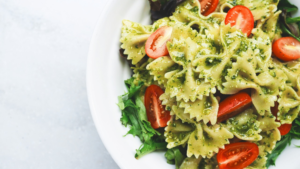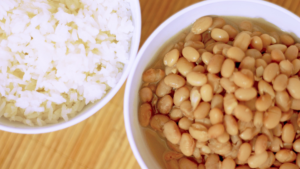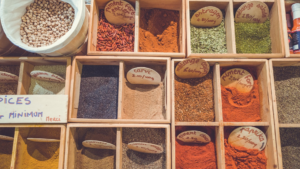Eating healthy or veggie on a daily basis for many people is a challenge. For some it’s due to economic reasons, for others lack of information on how to eat diverse meals and acquire enough protein and nutrients, for some just thinking about cooking is the biggest challenge.
If you feel related to this, here you have 5 keys for your quick and easy vegetarian meal plan.
Organization is crucial when you start changing your eating habits, getting the right food, recipes and knowledge will help you take this lifestyle long-term.
Easy steps for your vegetarian meal plan

-
Vegetable protein:
Protein has a structural function in our bodies, and It is a common belief that the only source of protein is from animals, but there are also sources of veg protein. Combining plant-based protein sources, all essential amino acids can be obtained from the diet.Amino acid supplementation is easy and simple, since it doesn’t have to be digested at the same meal, but you can acquire it separately throughout the day being just as effective. For example, if at lunch you have a plate of legumes (such as lentil salad) and at breakfast a bowl of cereals (such as a bowl of oatmeal) or a handful of nuts, you would be obtaining the limiting amino acid left from the meal.
To get the right amount, you have to combine all sources of vegetable protein throughout the day. Here are some combinations to have in mind when you prepare your vegetarian meal plan:
- Legume + cereal= lentils/hummus made out of chickpeas and rice. Lentils and pasta
- Legume + dried fruit= lentils and almonds
- Nuts + cereal= nuts with oats

2. Seeds:
Having enough stock of these products will help you recharge energy throughout the day and improve your meals not only in protein but in flavor as well!
Key tip to all seeds digestion: It is convenient to roast or grind them to make the most of their properties, and to be easily digested as well.
Sunflower seeds: they’re the most caloric ones, and they are rich in potassium, a mineral that regulates the metabolism of water in the body. For this reason, they are very beneficial for people with circulatory disorders and hypertension. Also, it contains Calcium, Magnesium, Vitamins A, D, E and B, diuretic and antioxidant properties very useful in times of stress.
You can add them to your meals and salads and if you want to get the extra tip: toast them in a pan with a bit of salt and then process them. Add a bit of extra virgin olive oil, and you get a dip out of them! A delicious treat to replace butter or cheese.
Chia seeds: one of the plant based foods with the highest contain of Omega 3 and fatty acids. In addition, they contain mucilage, a type of fiber that is released when it contacts water, forming a kind of vegetable gelatin.
Therefore, they are great allies to apply in all foods, and its gelatin to cook your veggie meals and desserts.
Key seed to prevent constipation and regulate intestinal transit.
Chia seeds, in particular, provide up to seven times more omega 3 than blue fish. Talk about a super powerful seed!
Sesame seeds: a tasty source of minerals, proteins and fiber. They are rich in leic acid the same fat that foods such as avocado and olive oil provide! They help to reduce bad cholesterol.
You can also make Tahini with these seeds, making the following procedure: toast them for 5 minutes in a pan with a bit of coconut oil and salt. Afterwards, process them and with a bit of water an olive oil altogether, when you achieve a homogeneous paste you got your tahini! A great dip to replace dairy and butter.
Pumpkin seeds: a healthy snack that stands out for their nutritional contribution of fiber and natural antioxidants such as vitamin A and E. Also, as vitamins of group B which balance the nervous system. They contain Zinc which is a key mineral for the proper function of our immune system!
Other varieties of seeds to have in mind: Flax and poppy seeds are great allies as well for your vegetarian meal plan.
3. Nuts to complement your day:
Nuts and seeds are good sources of protein, healthy fats, fibers, vitamins and minerals. Having them present in your daily basis will get you the right amount of their benefits to regulate food intake, burn of energy and health aspects as preventing diseases.
Almonds, Brazil nuts, Cashews, Pecans, Walnuts, Hazelnuts, pistachios, Macadamia nuts and peanut are a couple of options to have in mind as good sources of dietary protein. Some of their beneficial aspects when you get them for your vegetarian meal plan:
Pistachios: they are good in protein and fiber, iron, zinc, vitamin A, E and potassium. Also delicious and energetic to have in hand when you want to get a healthy-salty snack!
Almonds: rich in fats and essential minerals such as Zinc, magnesium, potassium, iron and some B vitamins. It’s best to consume them with foods rich in vitamin C, such as citrus fruit (oranges, grapefruit, kiwi) or vegetables such as broccoli and spinach.
Of all nuts, these are the ones that contain most calcium, its oil is especially good for skin.
4. Herbs and spices:
Spice up your cooking and start enhancing flavor with these herbs and spices that also provides benefits for your health. Learn about the beneficial aspects that spices bring along.
Turmeric, Oregano, Garlic, thyme, cumin, bay leaf, rosemary and pepper. Some of their benefits:
Turmeric is an excellent spice due to their powerful anti-inflammatory and antioxidant properties, you can add this to all your cooking: legumes, rice, vegetables as well.
It isn’t spicy, but instead it enhances flavor and gives you this beneficial aspects for your health.
Garlic: some people are resistant to garlic seasoning because of its strong smell, but if it’s cooked properly, you will get all the beneficial aspects, and the smell will be the least of your problems. It is Immune-supportive, anti-inflammatory, and has nutritional properties. Don’t be afraid to load up your garlic in ALL your meals, you won’t regret it.
Rosemary: this fragrant herb is powerful in antioxidants and anti-inflammatory. Also, It’s a good source of iron, calcium and vitamins A, C, and B-6, rosemary has been used for medicinal purposes for centuries. Spicing up your life with some of these herbs and spices will power up your vegetarian meal plan and health as well.

5. Vitamin B12 and supplements:
If you want to pursue a veggie lifestyle for long-term, you need to have in mind taking supplements at some point if you’re not getting enough vitamin 12.
Vitamin B12 is an essential vitamin for the cells. It’s important for keeping your nerves, blood cells, and DNA healthy. Most animal products contain this vitamin in more or less doses such as meat, dairy, and eggs are some sources.
Plant-based foods do not naturally contain B12, so people who follow a vegetarian diet or vegan diet need to make sure they get enough each day to avoid a deficiency.
A lack of vitamin B12 can lead to serious health consequences, such as pernicious anemia.
Start by taking supplements but first go to your doctor or health professional to check everything your body needs, all bodies are different, and we don’t have to follow general rules. I expect this article was useful to have in hand for your vegetarian meal plan, so you can start with confident steps to a healthy lifestyle. Subscribe to join our community and access to more articles!
